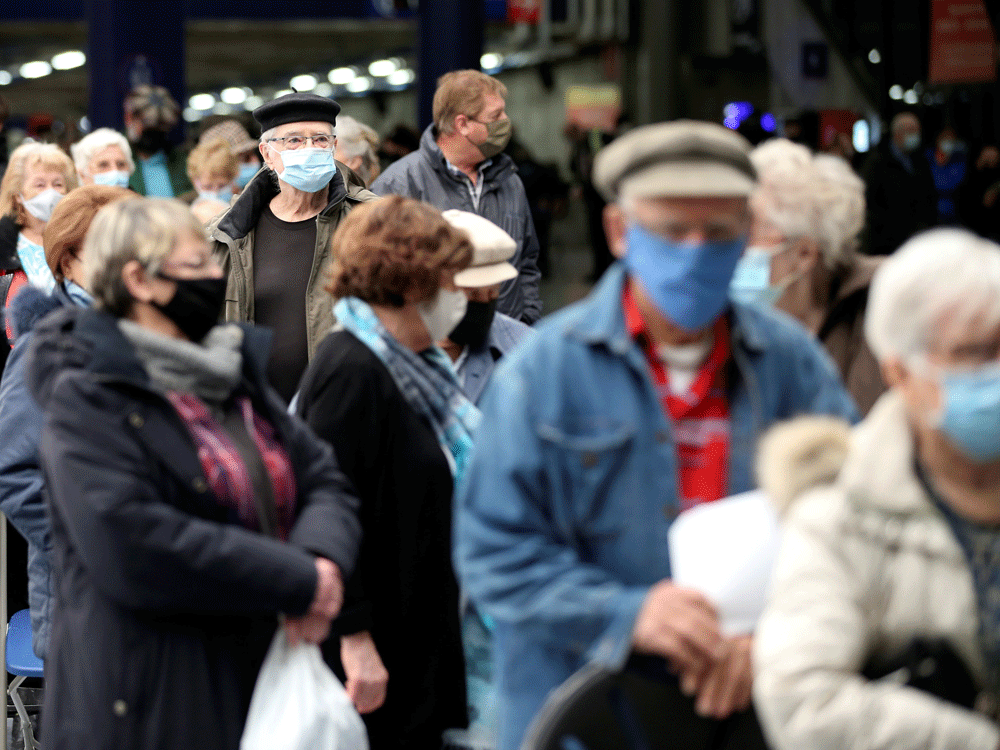the pandemic may be slowly slogging toward a merciful end but for some, the anxiety-induced nightmares won’t be fading to black anytime soon.the ongoing existential threat posed by the virus has left large segments of the population struggling to cope with previously unseen levels of stress that — combined with ensuing changes to sleeping patterns — can produce disturbing “quarandreams.”“this is something that we’ve seen in other traumatic events that occur around the world and in our country,” raj dasgupta, a sleep specialist and assistant professor of clinical medicine at the keck school of medicine at the university of southern california,
told cnn. “so the fact that we’re having more nightmares during this pandemic doesn’t surprise me.”the restlessness began just over a year ago as waves of lockdowns freed many from the monotony of their daily commute, leaving them willing and able to stay up later than they otherwise might. the longer one sleeps in, the more likely they are to experience deeper stages of rem sleep, the time the brain uses to process and store memories from the previous day.it has also led to some really strange dreams, said deidre barrett, an assistant professor at harvard medical school
who designed a quiz to get a better sense of how the pandemic is pestering people after hours. “there are armies of cockroaches racing at the dreamer,” she said. “there are masses of wriggling worms; there were some grasshoppers with vampire fangs; there are bed bugs, stink bugs.”metaphors for the pandemic were hard to miss, she said, unleashing massive devastation in the form of tornadoes and tsunamis, hurricanes and earthquakes and — unsurprisingly given the source — the arrival of mass shooters. other nightmares focused on the sensation of being trapped or caught in public without a mask, unable to avoid the constant coughs of other people.some were far, far worse. “there was a woman who in reality was homeschooling her child, but she dreamed that someone had decided that her child’s entire class had to come and live with her,” barret said. “people who are sheltering at home alone will dream that they’ve been locked up in prison, or one woman was sent to mars by herself to establish the first one-person mars colony.”another common theme was a terrifying inability to help a loved one overcome the crisis. “they tend to involve taking care of someone who’s dying of covid-19, and they’re trying to do something like put a patient on a respirator, or get the tube reattached that’s come off a respirator, or the respirator machines are not working,” barrett said. “so they feel like it’s their responsibility to save this person’s life and yet they don’t actually have much control over it and the person is dying anyway. that’s their nightmare. it’s the worst moment from their daytime experiences.”even as the world inches its way out of the pandemic, front-line workers and patients lucky enough to check out of the hospital will likely be dealing with ptsd-like symptoms for years to come.“i’m an icu doctor,” dasgupta said. “patients are not on the ventilator for days — we’re often talking weeks to months. they’re on medications, they’re lonely, it’s scary, so of course, they have post-traumatic stress nightmares.”to avoid a nightly replay of some of your worst fears, rebecca robbins, an associate scientist at brigham and women’s hospital in boston who studies sleep, recommends turning down the temperature before you turn off the lights. “we’ve done this experimentally with heat blankets,” she said. “if we administer heat blankets on people during sleep, we find the dreams are scarier, a little bit more in the nightmare category, and sleep is more fragmented.”if the cooler climate doesn’t help, robbins recommends talking to your doctor because depression, anxiety or the drugs used to treat either could be to blame. “there are some medications that do cause hallucinations and nightmares,” she said.
it’s also important
to prepare your body for sleep by leaving the screens on the other side of the bedroom door, taking a warm bath before bedtime and paying close attention to your sleep environment. you can even encourage your mind to cue up better content, barret said. “think of what you would like to dream about. you could pick out a person you’d like to see in your dream tonight, or a favourite place. if it’s a general one, like a person or place, just visualize that person or place,” she said.“if you have a particular favourite dream you’re focusing on, you might try to replay that in detail before falling asleep, and that would make you likelier to have a similar dream. that makes it likelier that you’ll dream about that content and it also makes it less likely you’ll have anxiety dreams.”
dave yasvinski is a writer with healthing.cadon’t miss the latest 世界杯决赛2022. subscribe to healthing’s daily newsletter.
 4 minute read
4 minute read









